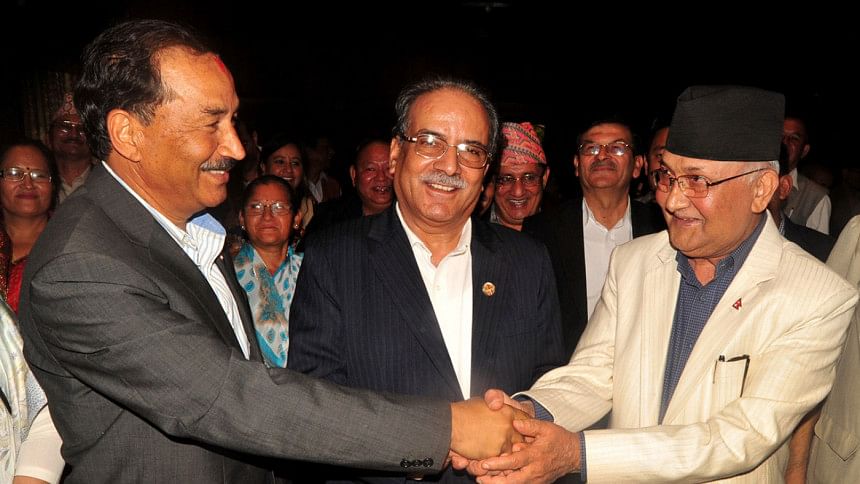Nepal’s 2 biggest communist parties agree to share power

The alliance of the Communist Party of Nepal-Unified Marxist-Leninist (CPN-UML) and the United Communist Part of Nepal-Maoist (UCPN-Maoist) is not limited to the formation of a new government but it also covers a larger power-sharing deal.
The two biggest communist parties in Parliament have agreed to the sharing of two key positions--prime minister and president--while sharing other positions such as vice president, speaker and deputy speaker with the other parties that vote for UML chair KP Oli in the prime minister election.
Maoist Chair Pushpa Kamal Dahal told a Parliamentary Party meeting on Saturday evening that the door had opened for the party to claim the presidential post with the Nepali Congress fielding its own PM candidate.
Leaders from the communist parties claim that the UML and the UCPN (M) have reached an understanding to support a Maoist candidate in the presidential election slated to be held later this month.
"The UML has agreed to extend its support to us in electing our candidate as the President," said Maoist chief whip Giriraj Mani Pokharel. The Maoist party is yet to decide its presidential candidate.
According to UML leader Rajan Bhattarai, the Maoist claim for the presidential berth is natural in the context of the NC's refusal to be part of a UML-led government as per a "gentlemen's agreement". The NC, UML, UPCN (Maoist) and the Madhesi Janadhikar Forum-Loktantrik are said to have made the understanding before signing a 16-point agreement in June.
The UML and the Maoist parties have publicly called for the NC to honour the understanding. Top leaders of the four parties reportedly agreed informally to allow the UML to lead the new government after constitution promulgation while allotting the president's post to the NC and the speaker to the Maoists.
NC's decision to field its own candidate has ended the 18-month partnership between the two largest parties that made constitution promulgation possible.
On portfolio allocation, the parties have yet to decide formally as the number of parties supporting Oli remains unclear. Dahal briefed the Maoist PP meeting that the allocation of key positions and Cabinet portfolios would be decided only after government formation. "Gachhadar [MJF-L chairman] has also pledged to join us," a Maoist leader quoted Dahal as saying.
Although UML leaders confirmed that Bijaya Gachhadar had assured Oli of support, the MJF-L has not yet formally decided about it.
Before backing the UML chairman as the PM, two major parties inked a 14-point agreement. The deal signed by Oli and Dahal is about staying firm in favour of national sovereignty, territorial integrity and national independence, and against any external pressure. Taking serious exception to the blockade imposed by India, both the parties have agreed to formulate immediate and long-term plans to tackle the problems.
Without naming India, the document states their decision to request the neighbouring country to ensure smooth supply of essentials to a landlocked Nepal as ensured by international laws.
The parties also committed to safeguarding the achievements of the Constituent Assembly and their effective implementation. Additionally, the parties agreed to address the concerns of agitating Tharu and Madhes-based parties and other groups through dialogue.
They would also start rebuilding quake-ravaged villages and infrastructure. The parties would address problems concerning workers, women, Dalits, indigenous communities, Muslims and the marginalised.
Copyright: The Kathmandu Post/Asia News Network

 For all latest news, follow The Daily Star's Google News channel.
For all latest news, follow The Daily Star's Google News channel. 



Comments